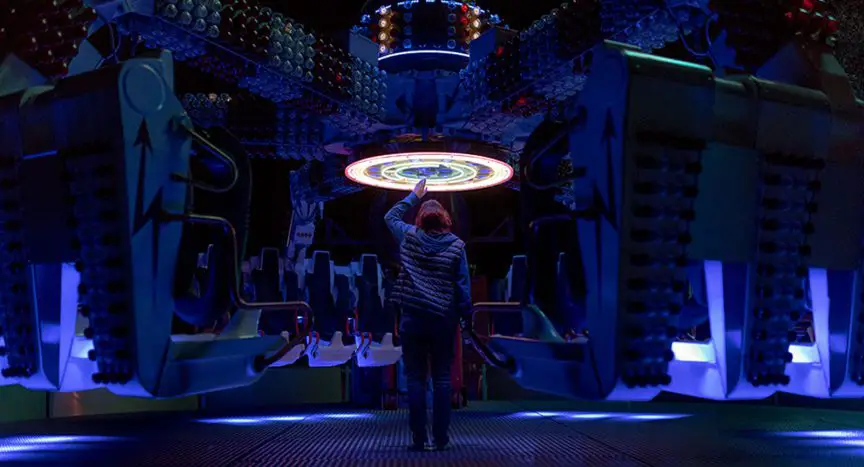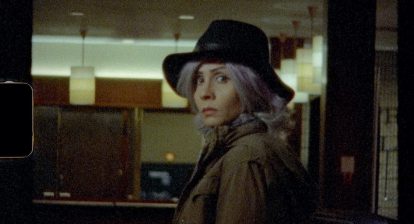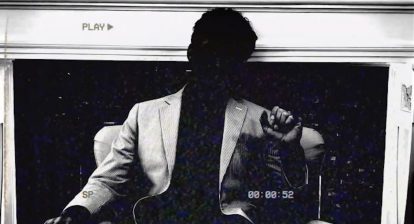Zoé Wittock’s Jumbo is a movie that defies any easy characterization, and is at alternating turns an outsider coming of age narrative, a family melodrama, and a visually lush tale of first love (and lust). Tying it all together is a loose “based on a true story” hook of objectum sexuality, where a human forms intense attractions to inanimate objects.
In this case, the human is a withdrawn carnival worker named Jeanne. The object of her affections? An amusement park ride at her workplace. The thrill ride is actually called the Bump It, but Jeanne affectionately nicknames the structure Jumbo.
See Also: The Pandemic Anthology is Horror Spiked with Much Needed Humor [Chattanooga FF Review]
With a leading man made of metal, the bulk of the work of the love story falls on our principle actress. Noémie Merlant (Portrait Of a Lady On Fire) is well cast as Jeanne, using some impressive physical character work to fill in the gaps left by a somewhat minimal approach to dialog.
Jeanne floats through her days like a sleepwalker, and stumbles through even the simplest of interactions with a wince and a hard swallow, as if the act of forming words is physically painful. Jeanne’s well-meaning mother Margarette (Emmanuelle Bercot) tries to draw her out with everything from pop song singalongs to awkward blind date set ups with Marc (Bastien Bouillon), Jeanne’s boss at the amusement park. Jeanne, meanwhile, is perfectly content to tinker alone in her room, building scale models of fairground rides.
Clearly more comfortable amongst machines, Jeanne seems much more at ease in her nightly cleaning duties at the amusement park, delicately polishing steel and dusting lightbulbs. In the course of her duties, she notices one particular ride seemingly responding to her touch with anthropomorphized mechanical rumbling and blinking of lights. 
In a film full of self-assured, lush visuals, the scenes where Jeanne is courting the object of her affections are some of the most beautiful of all, mixing the magical realism of The Shape Of Water with the awe from on high effects of Close Encounters Of The Third Kind. Noémie Merlant’s face is bathed in the vibrant colors of the ride’s lights, finally alive, literally aglow with first love. The dizzying feeling of falling head over heels is made literal as she swoops through the air on a carnival ride for one, culminating in a sensually surrealist consummation of their relationship, puddles of the machine’s fluids gliding over Jeanne’s body.
It is when Jumbo abandons these fanciful, fairy tale touches that the film comes crashing back down to earth. What surrounds the central love story is a thinly plotted melodrama, with all of the human characters’ erratic behavior and motivations merely in mechanical service to a familiar plot that manages to be both trite, and full of loose ends.
A vague allusion to Jeanne being either a trauma survivor or possibly having a mental illness diagnosis leads nowhere. It’s never made clear if Margarette drove Jeanne’s father away, or if he left the family of his own volition. A random group of unnamed bullying teenagers pops in and out of the film, with no other purpose than tormenting Jeanne with stalkerish regularity, and forcing her to run off to wherever might be a more convenient location for the next story beat.

Jeanne is at least given the empathy of a consistent characterization, and as the inevitable second act reversals and obstacles to her forbidden love occur, it gives Noémie Merlant another chance to showcase her intrinsic understanding of loss, loneliness and longing, in similar emotional territory to her masterful performance in Portrait Of A Lady On Fire. In lesser hands, the endless parade of well lit pouting, dramatic collapses and delicate tears would become soap opera levels of tedious.
This grace does not extend to any of the other characters, who basically get reduced to plot devices. Marc’s overly persistent and forceful attempts to become Jeanne’s boyfriend are a source of menace in the first act, but we are clearly meant to feel sorry for him when Jeanne rejects him for good, and to see his outright humiliation of her at a end of season employee party as a tough love attempt to reconnect Jeanne with other people, when it is merely a jilted man’s cruelty.
See Also: Skull: The Mask is Nasty, B-Movie Fun [Chattanooga Film Festival Review]
Margarette doesn’t fare much better. Initially, she is a bit too concerned with being Jeanne’s friend, with all of the oversharing that comes with a heavy handed effort at being the “cool mom”. In the back half of the film, Margarette twists into a scheming harpy who is all too happy to toss her daughter out into the street, then plot with Marc to make sure the offending ride is sold off, attempting to make Jeanne “normal” by force. While this arc isn’t impossible given the context of their fight, the compressed amount of screen time in which it occurs makes it feel both rushed and contrived.
The late in the film addition of Margarette’s new boyfriend, Hubert (Sam Louwyck) is left to be the moral center of the film, and facilitator of the heavily telegraphed third act reconciliation where Margarette learns to accept Jeanne (and her newfound love interest) as they are.
Also See: Greatest Show on Earth: Why People are Drawn to Carnival Horror
Lying underneath all of this paint by numbers script anemia is a bunch of big beautiful ideas, from the universal importance and validity of love to a unique, somewhat queer coded subtext on romantic awakening and coming of age outside of arbitrary standards. Unfortunately, Jumbo fails to give its human characters or underlying themes the needed emotional heft to be the feel good modern fable it aspires to be. While unfailingly stylish, a lack of sturdy structure makes Jumbo an aesthetically pleasing but frustrating ride through missed opportunity that collapses under the weight of its titular attraction.
Wicked Rating – 6/10
Directors: Zoé Wittock
Writers: Zoé Wittock
Stars: Noémie Merlant, Emmanuelle Bercot, Bastien Bouillon, Sam Louwyck
Release date: January 24 2020 (Sundance Film Festival)
Studio/Production Company: Insolence Productions
Language: French
Run Time: 93 minutes





